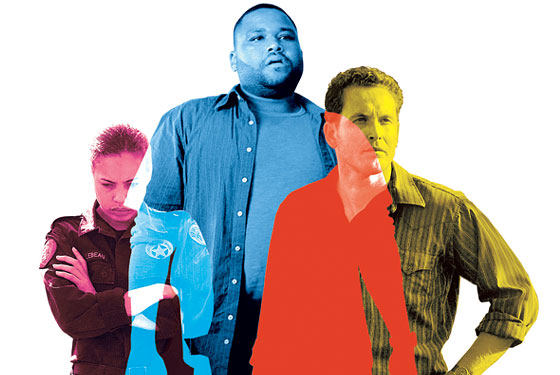
Again and again in the pilot episode of K-Ville, we see snapshots of the devastated Upper Ninth Ward of New Orleans: nightmare flashbacks of biblical floods; houses smashed by a giant fist; anarchy and refugee camps; flotsam, jetsam, and debris where once upon a time there’d been a neighborhood. Again and again, like Oedipus at Colonus or Lear on the blasted heath, a New Orleans cop named Marlin Boulet (Anthony Anderson) will rage against the elements, by which he doesn’t mean the weather. As his city was abandoned by the local, state, and federal governments, Marlin, too, has been abandoned, first in the middle of Katrina by his panicked partner on the Felony Action Squad, Charlie Pratt (Derek Webster), who absconded with their patrol car, and then, two years later, by his estranged wife, Ayana (Elise Neal), who intends to take their traumatized young daughter to Atlanta, as far away as she can get from the bad schools, the berserk crime, and the demoralized remnants of the former Big Easy. Even Marlin’s longtime next-door neighbor in “the Nine” is selling out to real-estate scam artists.
Marlin has what everybody else tells him are “issues”—a volcanic temper, a soul on fire, and a willingness, verging on eagerness, to bend the rules in the heat of action. His favorite jazz singer, Kaja Fontaine (Fahnlohnee Harris), is gunned down at a charity benefit, if not by her ex-boyfriend who deals drugs from a shrimp boat, then maybe by the ex-commandos working security for the big new casino. Or is the target the charity itself, a masquerade of the Garden District pretending to care about the Upper Ninth? Marlin’s new partner, a white man named Trevor Cobb (Cole Hauser), may indeed have been a soldier in Afghanistan but certainly isn’t telling the truth when he says he originates in Cincinnati. His old partner, now a hotel house detective, keeps showing up at Marlin’s crime scenes, among the surveillance cameras and automatic-weapons fire, looking for forgiveness. Everyone in K-Ville—which stands, of course, for “Katrinaville”—is looking for either redemption or revenge.
If you saw Anderson during his villainous seasons on The Shield, you already know he commands the camera. His fellow cops—John Carroll Lynch, Maximiliano Hernández, Tawny Cypress, and Blake Shields—are the usual polyglot infantry trench, with the usual bunker jokes, what we might even call a gumbo. K-Ville’s co–executive producers are both cop-show veterans—Jonathan Lisco of NYPD Blue and The District, Craig Silverstein of Bones and Standoff—who know how to yank our chains with close-ups, jump cuts, booster shots of adrenaline, and low-rent noir. Whether rage alone can sustain a series remains to be seen, although class war and race hate seem to be in inexhaustible supply here, and the show has hardly begun to touch the rich reservoir of music. Imagine guest appearances by Fats Domino and Dr. John.
But I’m rooting for K-Ville to last at least till a year from November, through the next presidential election. It is not enough that anniversaries of Hurricane Katrina and its aftermath of spectacular incompetence and depraved indifference should be pious occasions for television sermonettes; whole Establishments should be held accountable. These images of devastation have chased earlier home movies out of our aching heads—a New Orleans of Dixieland, Bourbon Street, Mardi Gras, the French Quarter, bohemian decadence, and a Streetcar Named Blanche DuBois; the artsy-fartsy New Orleans of William Faulkner’s Mosquitoes, the down-and-out New Orleans of Nelson Algren’s A Walk on the Wild Side, and the stricken-world New Orleans of Robert Stone’s A Hall of Mirrors, with race riots, voodoo dolls, graveyards, Fascism, and Dante’s Inferno; a nostalgic New Orleans where a hallelujah chorus of Bob Dylan, the Animals, and Frijid Pink sings “The House of the Rising Sun.”
Instead, we have the New Orleans of Spike Lee’s epic When the Levees Broke, in which the grand-operatic bungling of FEMA, the gross ineptitude of the Army Corps of Engineers, the corrupt opportunism of the insurance companies, the cowardly finger-pointing of the governor and the mayor, and the fugue-state insensibility and denial of our only president stare back at us from freeze-frames of arrogant past and anguished present, sick-city misery and soul-stirring music, liars and body bags. And the New Orleans of James Lee Burke’s furious new novel The Tin Roof Blowdown, in which the recovering-alcoholic police detective Dave Robicheaux seeks justice in Katrina’s violent wake. Marlin Boulet could have stepped easily out of Lee’s scalding frame and Burke’s radiant pages, speaking execration.
K-Ville
Fox. Premieres September 17 at 9 p.m.